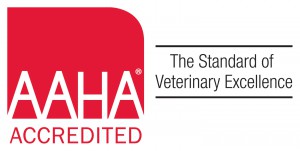About Our American Animal Hospital Accreditation

We are the only emergency care facility in Tampa accredited by the American Animal Hospital Association. Do you know what this accreditation means to you and your pet?
The American Animal Hospital Association is the only organization that accredits small animal hospitals throughout the U.S. and Canada. AAHA-accredited hospitals voluntarily choose to be evaluated on 900 standards. Veterinary hospitals accredited by AAHA must demonstrate an exceptional level of medical care and client service and they are re-evaluated every three years to make sure they are keeping up with industry updates.
Veterinary practices choose to become AAHA-accredited for a myriad of reasons, including the desire to improve practice operations and team building, update their skills, enhance their credibility with clients and strive for continuous improvement. Approximately 3,200 veterinary hospitals in the United States and Canada have made a commitment to meeting the highest standards of veterinary care.
Choosing an AAHA-accredited hospital assures pet owners that the hospital they select has the staff, equipment, medical procedures and facilities that AAHA believes are vital for delivering high-quality pet care.
Accreditation Matters: Surgical Protocols Reassure Pet Owners
Veterinary medicine has advanced quickly, and the range of treatment options is not only broader but safer than ever before. Even so, finding out your pet needs surgery can be frightening.
Although complications are always possible, the AAHA Standards of Accreditation help ensure your pet benefits from the best surgical techniques and sterile practices. Surgical protocols at AAHA-accredited clinics include:
Pre-surgical assessments Prior to surgery, the veterinary team verifies the specifics of the procedure; completes a physical exam of the patient; and ensures blood tests have been completed, documented, and reviewed by the veterinarian. Among other things, these precautions help determine if your pet is at risk for complications while under general anesthesia.
Dedicated surgical suites. To prevent post-surgical infections and cross-contamination, surgeries are performed in a room used only for sterile surgical procedures.
Surgical attire. Staff must wear disposable caps and masks when entering the surgical suite. Anyone involved in the procedure itself must also wear sterile gowns and single-use gloves.
Sterile packs and equipment. Surgical instruments are carefully cleaned, sterilized, and wrapped prior to each procedure to help prevent infections.
AAHA’s Standards of Accreditation diminish the risks associated with surgery and help ensure the highest level of care. The safety and comfort of your “best friend” are always of the utmost importance.
Anesthesia Standards
Veterinary medicine is regulated by state agencies, and each state maintains its own minimum regulations. Although AAHA-accreditation is voluntary, AAHA is the only organization in the US and Canada that accredits companion animal hospitals based on standards that go above and beyond state regulations. The AAHA Standards of Accreditation include more than 900 individual standards, divided into 19 major sections including anesthesia.
Anesthesia is a drug-induced, reversible loss of consciousness that allows pets to undergo complicated or painful medical procedures without the distress or pain they would normally feel if they were conscious. Although anesthesia is necessary for many veterinary procedures, it is important to understand that undergoing anesthesia is not a simple procedure. While undergoing general anesthesia, pets often cannot control their own airway or breathing, making the use of ventilators and breathing tools essential. Animals can also have adverse reactions to the anesthesia drugs administered before, during and after surgery. Despite the potential hazards, anesthesia is critical to provide humane care and can be relatively safe if proper steps are taken.
To decrease the likelihood of anesthesia related complications, the AAHA Standards of Accreditation address pre-anesthetic and emergency procedures; patient monitoring before, during and after surgery; and anesthetic supplies and equipment. Among the many standards in the anesthesia section, AAHA has standards that address that patients receive a patient assessment performed by a practice team member prior to the administration of premedication, sedation or anesthetic. Additionally, AAHA Standards recommend that a sufficient number of practice team members be trained in pet cardiopulmonary resuscitation (CPR) to ensure the availability of a trained team member during normal hours of operation and patients are observed at frequent intervals until fully recovered.
The Standards, developed by AAHA, are widely accepted as representing those components of veterinary practice that represent high quality pet care. The Standards are periodically reviewed and updated by a committee of experts and practitioners to ensure that they remain consistent with evolving veterinary knowledge and technology.
